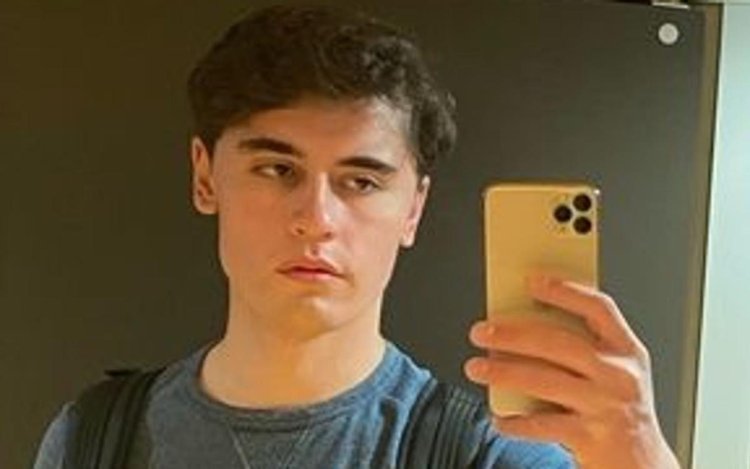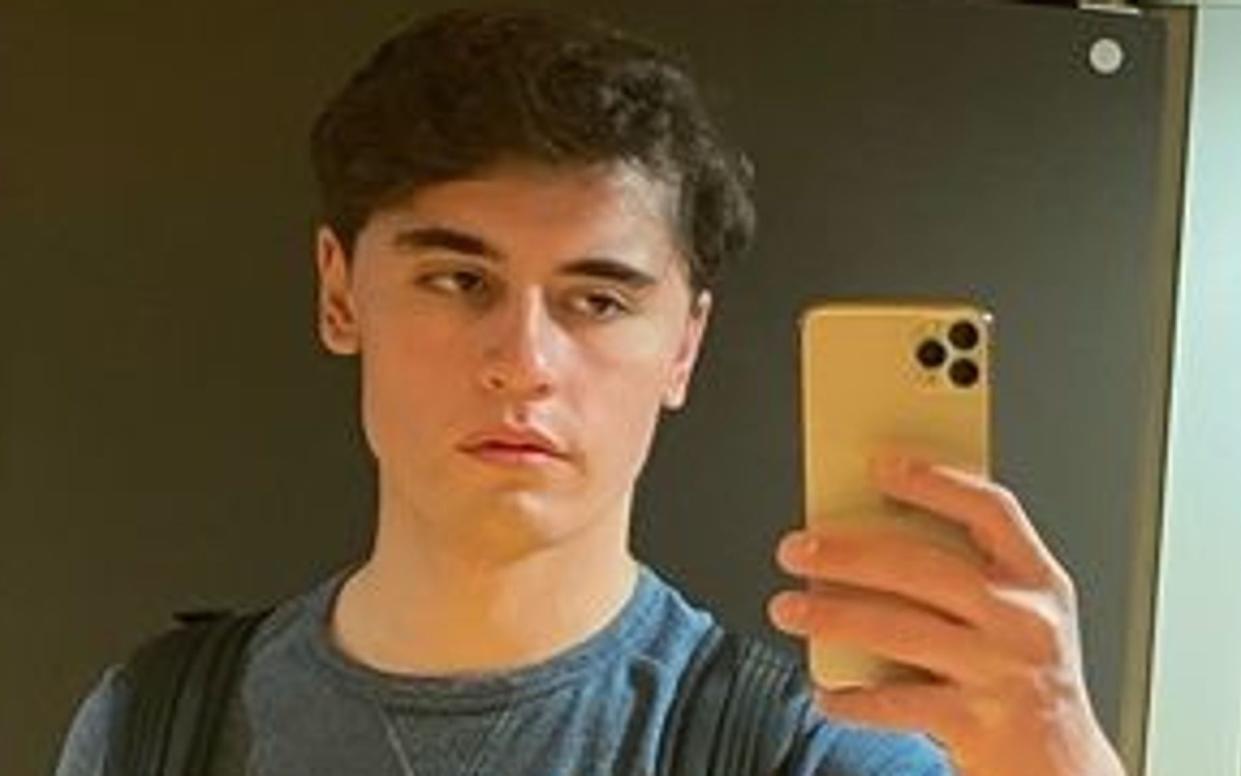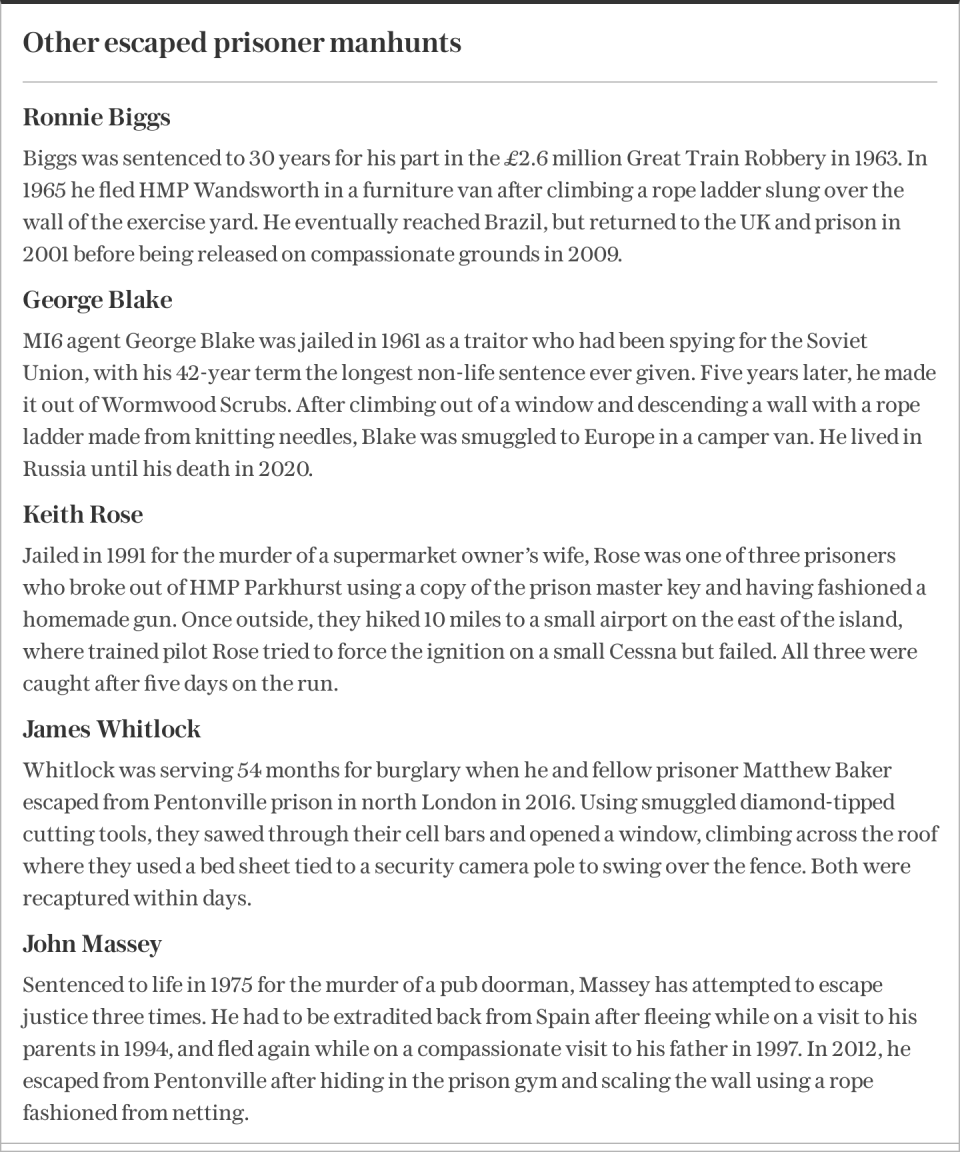How the Daniel Khalife manhunt came to a dramatic end by a London canal
Daniel Khalife was thrown from his mountain bike by a plain clothes officer shortly before 11amA 75-hour manhunt for a terror suspect accused of spying for Iran came to a dramatic end beneath a graffiti-strewn bridge spanning the Grand Union Canal on Saturday.On a towpath alongside brightly coloured narrowboats in Northolt, west London, Daniel Khalife, 21, was thrown from his mountain bike by a plain clothes officer shortly before 11am.Startled eyewitnesses described how the former soldier, who had broken out of HMP Wandsworth four days earlier, looked bewildered as three officers pinned him down, tying his hands behind his back.Khalife laughed and told police: “It’s not me. I haven’t done anything,” according to one report in The Sunday Times.The arrest, on suspicion of being unlawfully at large and an escaped prisoner, ended a humiliating jail break that has brought the question of how terror suspects are housed and treated within the prison system into sharp focus.At a hastily conve


A 75-hour manhunt for a terror suspect accused of spying for Iran came to a dramatic end beneath a graffiti-strewn bridge spanning the Grand Union Canal on Saturday.
On a towpath alongside brightly coloured narrowboats in Northolt, west London, Daniel Khalife, 21, was thrown from his mountain bike by a plain clothes officer shortly before 11am.
Startled eyewitnesses described how the former soldier, who had broken out of HMP Wandsworth four days earlier, looked bewildered as three officers pinned him down, tying his hands behind his back.
Khalife laughed and told police: “It’s not me. I haven’t done anything,” according to one report in The Sunday Times.
The arrest, on suspicion of being unlawfully at large and an escaped prisoner, ended a humiliating jail break that has brought the question of how terror suspects are housed and treated within the prison system into sharp focus.
At a hastily convened press conference, Dominic Murphy, the Metropolitan Police’s counter-terror commander, insisted that 75 hours of being on the run was not “a long time” to evade detection, adding: “This is not a television programme. This is a real life manhunt.”
The search had “gathered momentum” on Friday afternoon as a flurry of calls from the public and intelligence came into their control centre.
Intelligence had been received linking Khalife to a home in the borough of Richmond, just south of the River Thames. Although he was not found at that address, new sightings came in, suggesting he had crossed Chiswick Bridge into Chiswick.
From around 10pm, two police helicopters were carrying out relay searches across the borough using night vision cameras. On the ground, scores of armed officers and police with sniffer dogs carried out intense searches.
Paul Wade, a Chiswick resident, opened his curtains to find five officers outside his home. The 79-year-old said: “They said: ‘I expect you know why we are here.’
“They were checking everybody’s gardens. As we understand it, they just clambered over the walls and inspected – they didn’t wake everybody up. They just checked. They had helicopters above.”
Shortly after 2am, Khalife was spotted by a member of the public in Spencer Road, not far from the historic Chiswick House and Gardens.
He was then seen in Church Street, near Hogarth Roundabout – a key route out of London – and Chiswick Mall, near Fuller’s Brewery on the River Thames.
Mr Murphy said the reports were considered “confirmed sightings”, and immense police resources were thrown at tracking Khalife down.
It is believed the fugitive used a mountain bike to weave his way along the river towpath up through quiet Victorian streets before making his way towards Grand Union Canal in Greenford.
By now, more than 100 calls had been received by counter-terrorism police. Undercover officers had been deployed to key locations in the hope of spotting him.
At 10.41am, a few plain clothes officers stationed on a towpath of the canal sandwiched between Rowdell Road and the A40 flyover, noticed a young man on a bike pedalling hard and fast towards them.
An eyewitness, who did not want to be named, but was working near the canal at a yacht building company, said: “Khalife was on a push bike – then bosh, seconds later he wasn’t on the bike any more. There were three undercover officers and then about 50 to 60 police arrived.”
Mr Murphy told the press conference: “Khalife was arrested near Rowdell Road by a plain clothes officer. Khalife was riding his pushbike. He was pulled off that bike after being identified by officers.”
The fugitive was described as being “fully cooperative” after he was handcuffed. A video obtained by The Sun showed him seated on steps leading to a bridge up from the towpath as officers wearing blue shorts and tee-shirts stood around him.
Nearby was his bike, a sleeping bag and a Waitrose bag filled with groceries. He was wearing shorts, a white T-shirt and trainers, suggesting he had either had help to change his clothes or had found some discarded items while on the run.
Ethan Andrews, 20, who was on his way to a nearby gym and filmed the arrest, told The Sun he saw officers holding Khalife to the ground.
The Bath University student said: “I was crossing over the bridge and saw this man with cable ties around his hands. One of the cops said: ‘We’re undercover officers.’
“I keep up with the news and I recognised him and said: ‘Is that the guy who was in prison?’, and one officer said: ‘Yes.’ I pulled my phone out and started filming. The police told me not to, but how often am I going to see something like this again?”


The arrest marked the end of an intense search that focused on a relatively small area of London.
At 7am on Wednesday, Khalife had left the Wandsworth Prison kitchens, where he had been preparing breakfast, to help unpack food supplies from a BidFood truck that had just arrived with its routine delivery.
Wearing distinctive red and white gingham chef’s trousers and a white T-shirt, he somehow slipped through the security “airlock” to sneak beneath the vehicle’s undercarriage.
At 7.32am, control room staff gave the all-clear for the truck to leave. It appears highly unlikely that prison officers used mirrors to check underneath the truck.
If they had, they would have found Khalife strapped to the underside, having apparently fashioned a plastic cover from a mattress into supports to secure him against the vehicle as it travelled westwards to its next delivery.
The prison went into lockdown at 7.50am when it dawned on guards that Khalife was missing.
Twenty-five minutes later, police were informed and the manhunt began. Met Police officers stopped the lorry on the Upper Richmond Road. By then, it had travelled three miles. CCTV footage from a nearby shop showed police searching the vehicle with a sniffer dog.
Khalife’s one hour and five-minute head start had given him an invaluable advantage. Members of the public were urged to be vigilant but not approach him. Extra security was put in place at ports and airports. More than 150 counter-terrorism police were drafted in to help.
The daring prison break raised the possibility that Khalife had inside or outside help. As questions were asked about why a former soldier accused of spying for Iran had been kept in Wandsworth Prison rather than a maximum security unit – let alone been granted prisoner privileges to work in the kitchens – the security of 271 terrorism prisoners was placed under urgent review.
Mr Murphy told a media briefing he was not underestimating Khalife. He described Khalife as a “trained soldier” from the Armed Forces that make up “some of the best military in the world”.
Khalife was accused of planting fake bombs – three canisters with wires protruding from them – at his MoD Stafford military base in January.
A preliminary court hearing was told how he left the device “with the intention of inducing in another the belief the item was likely to explode or ignite”. He vanished for more than three weeks after the bomb hoax before being arrested on Jan 26.
He was first arrested in August 2021 on suspicion of breaching the Official Secrets Act. At one court hearing in July this year, he was charged with a further Official Secrets Act breach.
The 21-year-old was discharged from the Army in May, and denies the charges against him. Believed to be of Iranian descent, he is due to stand trial in November.
Although the nature of his alleged offences raised the prospect that he may try to flee the country, police focused on the belief he had remained in London – he was brought up in the Kingston area of south-west London and may even have a support network in the capital on which he could rely.


On Thursday, Alex Chalk, the Justice Secretary, confirmed that an independent investigation into the escape would take place. The next day, Sir Mark Rowley, the Met Police Commissioner, revealed that he believed the escape was “clearly pre-planned”.
On Friday morning, entrances to the vast Richmond Park, in the west of the city, were guarded by officers as helicopters patrolled overhead following reports that Khalife may have been spotted.
The park, near where he was brought up in Kingston, is about two miles from where he was apparently seen by an eyewitness leaving the prison food truck.
Within a few hours, the park’s roads were open to traffic as searches in Richmond were scaled back.
That night, two police helicopters carried out relay patrols over Chiswick and the wider west of the capital into the early hours following “intelligence-led activity” and confirmed sightings in the area by members of the public.
A source told The Telegraph: “The Met threw the kitchen sink at this. Every resource was being used, with every lead followed up.”
The force also offered a £20,000 reward for information on Khalife’s whereabouts. On Saturday night, Mr Murphy insisted that no one had yet claimed any of the reward money, but admitted that it remained a possibility after so much help from the general public.
What's Your Reaction?













